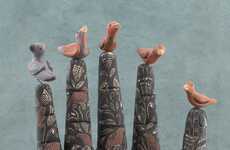
Cambodia Knits Employs Marginalized People in Phnom Penh
Bianca — February 29, 2012 — Social Good
References: cambodiaknits
Cambodia Knits are a series of quirky knitted creatures made by artisans in Phnom Penh. Creation of these designs provides ethical employment opportunities, and any residual profits are reinvested to expand the social enterprise and the cause.
The social enterprise was founded in 2009 by Monika Nowaczyk who was inspired after she learned about a similar concept in India.
"Having been aware of the difficulties faced by communities evicted from their urban homes to distant relocation sites, Monika wanted to set up an enterprise that would provide employment that was accessible and fair," the website explains.
Cambodia Knits has since taught over two dozen people how to knit and provided them with the opportunity to earn income from items that sell through the online store. The website also showcases the knitters, including photographs and short bios to give customers a glimpse into the product's history.
Contact Information
Cambodia Knits website
Cambodia Knits on Twitter
Cambodia Knits on Facebook
The social enterprise was founded in 2009 by Monika Nowaczyk who was inspired after she learned about a similar concept in India.
"Having been aware of the difficulties faced by communities evicted from their urban homes to distant relocation sites, Monika wanted to set up an enterprise that would provide employment that was accessible and fair," the website explains.
Cambodia Knits has since taught over two dozen people how to knit and provided them with the opportunity to earn income from items that sell through the online store. The website also showcases the knitters, including photographs and short bios to give customers a glimpse into the product's history.
Contact Information
Cambodia Knits website
Cambodia Knits on Twitter
Cambodia Knits on Facebook
Trend Themes
1. Social Entrepreneurship - There is an opportunity for other entrepreneurs to start a business that provides employment opportunities to marginalized communities.
2. Ethical Consumerism - Consumer demand for products that are ethically and sustainably made is increasing, creating an opportunity for businesses to cater to this market.
3. Artisanal Products - Artisanal products have gained popularity as consumers seek unique, handmade items, creating opportunities for businesses to work with local artisans.
Industry Implications
1. Fashion - The fashion industry can collaborate with marginalized communities to create ethical and sustainable fashion products.
2. Crafts - The crafts industry can work with local artisans to offer unique and handmade products to consumers.
3. Gifts and Novelties - The gifts and novelties industry can offer quirky and personalized products that are ethically made and support social causes, such as Cambodia Knits.
3.4
Score
Popularity
Activity
Freshness























